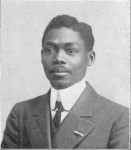
Diagne, Blaise
1872–1934 Senegalese politician The Senegalese politician Blaise Diagne was the first African elected as a deputy to the French National Assembly in Paris. Like all Africans born in SENEGAL during the colonial period, Diagne was an originaire—a French citizen with certain limited rights. Educated in France and at the University of Saint-Louis in Senegal, he worked in Africa […]
Development, Economic and Social
In general, development refers to a process by which countries use their natural and human resources to improve the economy and the lives of their people. Many experts also study development in terms of its outcome—the results that are achieved through economic, political, and social programs. A complex concept, development includes economic measures such as income and economic production, political measures […]
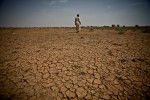
Deserts and Drought
Africa contains two desert regions, the SAHARA DESERT in the north and the Namib-Kalahari region in the southwest. Traditionally, very few people have lived in Africa's deserts. However, some groups inhabit the semiarid lands bordering deserts—areas that are somewhat wetter than the desert. The well-being of these people depends on rainfall, which varies greatly from year to year. With an […]
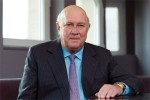
De Klerk, Frederik Willem
1936– South African political leader Frederik Willem De Klerk served as president of SOUTH AFRICA from 1989 to 1994. He was the driving force behind government efforts to end the country's official system of race discrimination known as APARTHEID. De Klerk was raised in a political environment. His father was a cabinet minister who served as president of South […]
Death, Mourning, and Ancestors
People who die are not buried in a field, they are buried in the heart,” goes a saying of the central African nation of RWANDA. Death of course is more than the physical fact of a life's end. It also brings emotional and social change to families and communities. Africans mark those changes with rituals that draw on traditional beliefs […]

Dar es Salaam
Dar es Salaam (which means “haven of peace” in Arabic) is the capital and largest city in TANZANIA. In the late 1990s, its population was about 1.5 million. Arabs from Southern Arabia first established fishing villages in the area during the A.D. 1600s, but the city did not really grow until Sultan Sayyid Majid of ZANZIBAR built a palace […]
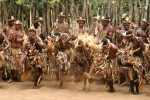
Dance
Through dance, African people celebrate, worship, educate, and express social organization. Styles vary greatly from culture to culture, but most African dance shares some common features. In particular, it emphasizes rhythm. Elements of traditional dance and music often blend with contemporary or foreign styles to create new kinds of African dance. Purposes of Dancing In all African cultures, dance is […]
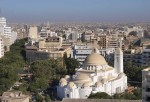
Dakar
Dakar, the capital and largest city in SENEGAL, is one of the most important ports of West Africa. The Portuguese landed near the site of modern Dakar in 1444, and several European powers fought over the region until the French gained control in the mid-1600s. The area was originally valued as a source for slaves. After the banning of […]
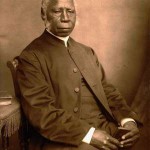
Crowther, Samuel Ajayi
ca. 1806–1891 Anglican bishop Samuel Ajayi Crowther was an educated traveler, translator, and missionary who was named the first African bishop in the Anglican Church. Born in what is now NIGERIA, Crowther was captured and sold into slavery at the age of 12. A British antislavery ship rescued him at sea, however, and took him to FREETOWN, SIERRA LEONE. […]
Creoles
In Africa, the term Creole refers to any people with some mix of African and non-African racial or cultural heritage. Creole populations can be found on most African islands and along many of the continent's coasts, areas where Africans first mingled with Europeans and Arabs. From these contacts, six major Creole types emerged: Portuguese, black American, French, Dutch, British, and […]
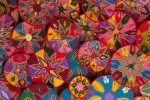
Crafts
For centuries Africans have produced handmade items such as cloth, baskets, and pottery to meet the practical needs of everyday life. Such handicrafts are also expressions of their makers' skills and of personal, regional, and cultural styles. Many are produced specifically for sale or for export to markets in other countries. Basketry Both men and women make many kinds […]
Correia, Mae Aurelia
Early 1800s Trader in Guinea-Bissau Mae Aurelia Correia was a wealthy and powerful trader in the GUINEA-BISSAU region from the 1820s to the 1840s. Among the many women traders of African or mixed ancestry at the time, Mae Aurelia was the most successful. Little information exists about Mae Aurelia's birth and family because the Portuguese colonial authorities in Guinea-Bissau […]
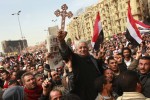
Copts
The Copts, a Christian sect in EGYPT, trace their history back almost 2,000 years. They follow customs and beliefs that they adopted long before Islam, the dominant religion in Egypt today, arrived in the region. According to tradition, Christianity was introduced to Egypt in the A.D. 40s. The city of ALEXANDRIA became a center of Christian scholarship, and the religion […]
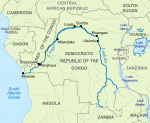
Congo River
For centuries the Congo River has played a key role in trade, travel, and exploration in equatorial Africa. The Congo and its many tributaries form the largest system of navigable waterways in Africa. For local peoples, the river is a vital highway of commerce and communication. The Congo flows for 2,900 miles in a great curve through the […]
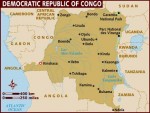
Democratic Republic of the Congo
POPULATION: 69.36 million (2014) AREA: 905,560 sq. mi. (2,345,410 sq. km.) LANGUAGES: French (official); Kongo, Lingala, Swahili, Tshiluba, Ngwana NATIONAL CURRENCY: Congolese franc PRINCIPAL RELIGIONS: Christian 80% (Roman Catholic 50%, Protestant 20%, Kimbanguist 10%), Muslim 10%, Traditional 10% CITIES: Kinshasa (capital), 5,064,000 (2000 est.); Kisangani, Lumbumbashi, Kanaga, Likasi, Mbandaka, Mbuji-Mayi, Bukavu ANNUAL RAINFALL: Varies from 30–60 in. (800–1500 mm) in south to 80–118 in. (2,000–3,000 […]
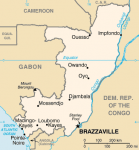
Republic of Congo
POPULATION: 4.559 million (2014) AREA: 132,000 sq. mi. (342,000 sq. km) LANGUAGES: French (official); Kongo, Lingala, Teke, Monkutuba, other Bantu dialects NATIONAL CURRENCY: CFA franc PRINCIPAL RELIGIONS: Christian (mostly Roman Catholic) 50%, Traditional 48%, Muslim 2% CITIES: Brazzaville (capital), 1,004,000 (1999 estimated population); Pointe-Noire, Kayes, Loubomo, Ouesso, Impfondo, Fort Rousset, Djambala ANNUAL RAINFALL: Varies by region, averaging about 60 in. (1,520 mm) per year ECONOMY: […]
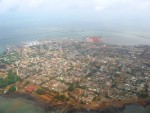
Conakry
Conakry, capital of GUINEA, lies at the tip of the Kaloum Peninsula on the western coast of Africa. The surrounding land is swampy, and its climate is tropical. During the rainy season, about 144 inches of rain fall in five months. About 1 million people live in the city. In the 1200s and 1300s, Conakry was part of the […]
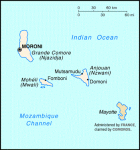
Federal Islamic Republic of the Comoros
POPULATION: 752,400 (2014) AREA: 838 sq. mi. (2,170 sq. km) LANGUAGES: French, Arabic (official); Comoran (a Swahili dialect) NATIONAL CURRENCY: Comorian franc PRINCIPAL RELIGIONS: Sunni Muslim 86%, Roman Catholic 14% ISLANDS: Grand Comore (Ngazidja), Anjouan (Nzwani), Moheli (Mwali), Mayotte (Maore); Capital: Moroni, 30,000 (1999 est.) ANNUAL RAINFALL: Varies from 43–114 in. (1,100–2,900 mm) ECONOMY: GDP $647.7 million (2014) PRINCIPAL PRODUCTS AND EXPORTS: Agricultural: vanilla, […]
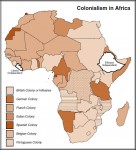
Colonialism in Africa
Colonialism, which refers to the establishment of political and economic control by one state over another, had an enormous impact on Africa. The colonial experience began in the late 1400s, when Europeans arrived and set up trading posts in Africa. It reached a peak in the late 1800s and early 1900s, when European powers dominated many parts of the continent. […]
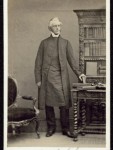
Colenso, John William
1814–1883 British missionary John Colenso was an outspoken critic of conventional missionary work who condemned the way colonial authorities treated Africans. Born in England, Colenso became the first bishop of the Diocese of NATAL in 1853 and established a mission station in the town of Bishopstowe. He was well-read in both Christian teaching and modern scientific thinking and discoveries. He […]

Coetzee, J. M.
1940– South African novelist The South African writer and literary critic John Michael Coetzee is known for novels that explore the effects of apartheid in his homeland. Coetzee studied at the University of Cape Town and at the University of Texas, where he received a Ph.D. in literature. He then returned to SOUTH AFRICA despite his opposition to the […]
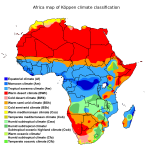
Climate
The diverse climates of Africa range from scorching deserts to icy glaciers, from steamy rainforests to grassy plains. Climate is a long-term weather pattern, the sum of features such as temperature, rainfall, and wind. The amount of heat from the sun plays a major role in determining climate. The equator receives more solar heat than any other part of the […]

Cleopatra
69–30 B.C. Egyptian queen Cleopatra, one of the most famous figures of ancient history, was the last ruler of EGYPT in the tradition of the pharaohs who had governed the land for several thousand years. She came to the throne in 51 B.C. as the wife of her brother, Ptolemy XIII. For several hundred years before that time, […]
Class Structure and Caste
African societies, like those in nearly all areas of the world, are divided into various groups or classes. Each class has its own distinct characteristics, roles, privileges and limitations, and relations with other groups. Only a few societies based on hunting and gathering have no formal division into classes. The class structure of African societies today is a patchwork. […]
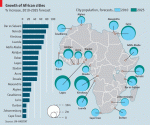
Cities and Urbanization
he image of Africa as a continent of traditional villages and small towns has never been correct. Africa has always included both highly urban and rural settlements. However, its cities have grown dramatically in recent years, and some researchers who study population trends have predicted that by the early 2000s about half of all Africans will live in urban areas. […]
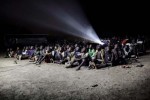
Cinema
eople in Africa have been watching, acting in, and making movies since the early 1900s. Until the 1950s, films were generally controlled by European colonial powers. The colonial governments oversaw production and decided which movies could be shown to the public. In the years since African nations gained independence, Africans have developed their own cinema with their own directors and […]
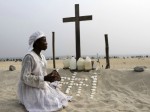
Christianity in Africa
African Christianity goes back to very early times, and the Christianity that developed in Africa influenced the religion's later growth in Europe. However, African Christianity ultimately developed its own special character in which local traditions played a role. This religion has had a profound effect on the social and political development of modern Africa. Today, membership in Christian churches is growing […]
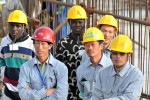
Chinese in Africa
From the late 1700s to the early 1900s, Chinese traders and laborers traveled to southern and eastern Africa to earn a living in the colonies established by Europeans. A large number of Chinese also moved to African islands such as MAURITIUS, REUNION, and MADAGASCAR. A second wave of immigrants settled in Africa in the 1920s and 1930s, a time of […]
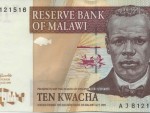
Chilembwe, John
1871–1915 Malawian nationalist John Chilembwe was a church leader and opponent of European colonialism in Africa. His activities helped inspire the independence movement in his country of MALAWI and nationalism in Africa. Schooled at a Scottish Presbyterian mission in Malawi, Chilembwe broke with the Presbyterians in 1892 after meeting Baptist missionary Joseph Booth. Booth took Chilembwe to the United States […]
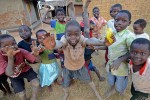
Childhood and Adolescence
For most Africans in the past, growing up meant helping the family produce food, learning the community's values, and gradually taking on new tasks, privileges, and responsibilities. After about 1900, however, patterns of childhood education and socialization began to change. Three major influences for change have been Western-style schooling, religious schooling in the Islamic nations of northern Africa, and the growth […]
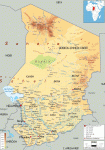
Republic of Chad
POPULATION: 13.21 million (2014) AREA: 495,792 sq. mi. (1,284,000 sq. km) LANGUAGES: French, Arabic (official); Sara, Sango, others NATIONAL CURRENCY: CFA franc PRINCIPAL RELIGIONS: Muslim 50%, Traditional 25%, Christian 25% CITIES: N'Djamena (capital), 826,000 (1999 est.); Sarh (Fort Archambeault), Moundou, Bongor, Doba, Lai, Abeche, Koumra ANNUAL RAINFALL: Variable, from 35–47 in. (900–1200 mm) in subtropical zone to 18–20 in. (200–500 mm) in Saharan zone […]
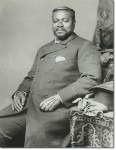
Cetshwayo
1832–1884 Zulu king Cetshwayo kaMpande was king of Zululand, in southeastern Africa, from 1872 to 1879 and again from 1883 to 1884. Although he fought with great skill and courage to keep his kingdom free and undivided, his efforts were overwhelmed by British colonial forces. During his early reign, Cetshwayo developed ties with Britain's coastal colony of Natal. He […]
Central African Republic
POPULATION: 4.709 million (2014) AREA: 240,324 sq. mi. (622,436 sq. km) LANGUAGES: French (official); Sango, Arabic NATIONAL CURRENCY: CFA franc PRINCIPAL RELIGIONS: Christian 50%, Traditional 24%, Muslim 15%, Other 11% CITIES: Bangui (capital), 524,000 (1999 est.); Baoli, Berberati, Bambari, Bossagoa, Carnot ANNUAL RAINFALL: Varies from 75 in. (1900 mm) in the south to 0.2 in. (50 mm) in the extreme northeast ECONOMY: GDP […]

Central African Federation
The Central African Federation was created in 1953 by the union of the British colonies of Northern and Southern Rhodesia and Nyasaland. Politicians had two reasons for forming this federation. One was to gain access to the copper mines of Northern Rhodesia and the cheap labor of Nyasaland. The other was to calm the fears of white settlers who were […]
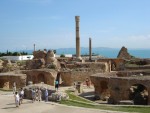
Carthage
Carthage, a rich and powerful city of the ancient world, once dominated the coast of North Africa. It stood on a peninsula in what is now TUNISIA, with a good harbor on each side. At one time the city controlled an empire that included North Africa, southern Spain, the Mediterranean islands of Sardinia and Corsica, and part of Sicily. […]
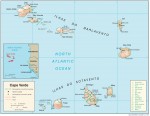
Cape Verde
The nation of Cape Verde (also known as Cabo Verde) consists of 15 islands about 400 miles off the coast of SENEGAL. Although the name means “Green Cape,” the islands actually have a hot, dry climate and very little arable land. The capital city of Praia is on the island of Santiago Before its discovery by the Portuguese in 1460, […]
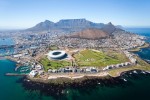
Cape Town
Located about 30 miles north of the Cape of Good Hope, Cape Town is the oldest city in SOUTH AFRICA. With its many gardens, parks, beaches, historical buildings, and mountains, it is considered one of the most beautiful cities in the world. Cape Town (known as Kaapstad in Afrikaans) was founded in 1652 as a supply station for Dutch […]

Cape Coloured People
Cape Coloured People are the mixed race population of various towns in Cape Province, SOUTH AFRICA. They are descendants of Dutch, British, and Kxoe people (various non–Bantu-speaking groups of southern Africa), as well as of slaves brought from MADAGASCAR and East Asia. Until the late 1950s, when apartheid policies were adopted in South Africa, most of the Cape Coloured lived […]

Canaries
The Canaries are a group of seven volcanic islands that lie off the northwestern coast of Africa. The westernmost islands are actually the peaks of mountains that rise from the ocean floor to heights several thousand feet above sea level. The eastern Canaries are much flatter. Gran Canaria and Tenerife are the two most important islands. The Canaries have […]
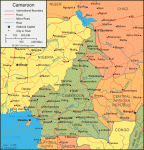
Republic of Cameroon
POPULATION: 22.82 million (2014) AREA: 183,568 sq. mi. (475,400 sq. km) LANGUAGES: French, English (official); Bantu dialects (24) NATIONAL CURRENCY: CFA franc PRINCIPAL RELIGIONS: Traditional 51%, Christian 33%, Muslim 16% CITIES: Yaounde (capital) 1,119,000 (1999 est.); Douala, Nkongsamba, Maroua, Bafoussam, Foumban, Garoua, Limbe, Bamenda, Kumba ANNUAL RAINFALL: Varies by region from 23 in. (600 mm) in the extreme north to 390 in. (10,000 mm) […]
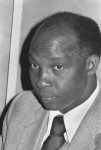
Camara Laye
1928–1980 Guinean author Camara Laye is one of Africa's best-known and most respected francophone (French-speaking) authors. His first novel, L'enfant noir (The Black Infant) is also one of his most popular. Written in 1953, the book tells of Camara's childhood in the town of Kouroussa, GUINEA. On the one hand, it is a personal account of the author's Mande […]
Calendars and Time
In African cities, many people use the Western system of clocks and calendars for official and business purposes. They divide the day into 24 hours and the year into 12 months based on the earth's movement around the sun. As in the West, a general system of dating is used to create a common framework for past events from […]

Cairo
Cairo is the capital of EGYPT and the largest city in Africa. The city's strategic location on the NILE RIVER has made it a defensive stronghold for Egypt for nearly 1,500 years. In medieval times, Cairo was one of the busiest centers of trade and education in the Mediterranean and Middle East. Today the city remains a vibrant hub […]
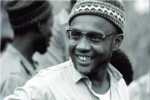
Cabral, Amilcar Lopes
1924–1973 Political and revolutionary activist Born in the Portuguese colony of GUINEA (later, GUINEA-BISSAU), Amilcar Lopes Cabral went to Portugal to study. After graduating from the University of Lisbon, he returned home a revolutionary leader, and he brought about Guinea-Bissau's independence. Cabral believed that people who opposed oppression should take action and commit themselves to social reform. He won respect […]
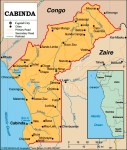
Cabinda
Cabinda, a province of the country of ANGOLA, is separated from Angola by a narrow strip of land belonging to the CONGO (KINSHASA). Though small in size (about 2,800 sq. miles), Cabinda has figured prominently in the economics and politics of the region for many years—particularly because of its valuable oil fields. Europeans visited the region in the 1500s […]
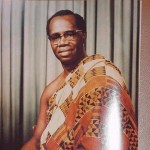
Busia, Kofi A.
1913–1978 Prime minister of Ghana Born into African royalty, Kofi A. Busia was elected prime minister of GHANA in 1969 and led his country for a brief period. In addition to politics, Busia focused on philosophy and economics. He earned a doctoral degree from Oxford University in England and wrote many books, including Africa in Search of Democracy (1967). […]
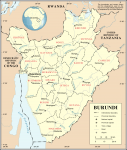
Republic of Burundi
POPULATION: 10.48 million (2014) AREA: 10,747 sq. mi. (27,834 sq. km) LANGUAGES: Rundi, French (both official); Swahili NATIONAL CURRENCY: Burundi franc PRINCIPAL RELIGIONS: Christian 67%, traditional 32%, Muslim 1% CITIES: Bujumbura (capital), 300,000 (1994 est.); Gitega, Ngozi, Kayanza, Mwaro ANNUAL RAINFALL: Ranges from 1,194 mm (47 in.) on the plateaus to 762 mm (30 in.) in lower areas ECONOMY: GDP $3.094 billion (2014) […]
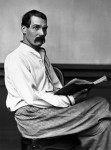
Burton, Sir Richard Francis
1821–1890 British explorer Sir Richard Francis Burton made four journeys in Africa in the mid-1800s. Although he failed in his mission to locate the source of a branch of the Nile River, he contributed greatly to European knowledge of African geography. Born in Torquay, England, and raised in France and Italy, Burton served in the British army in […]
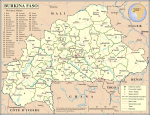
Burkina Faso
POPULATION: 17.42 million (2014) AREA: 105,869 sq. mi. (274,200 sq. km) LANGUAGES: French (official); Mossi, Dyula, many local languages NATIONAL CURRENCY: CFA Franc PRINCIPAL RELIGIONS: Muslim 50%, traditional 40%, Christian 10% CITIES: Ouagadougou (capital), 1,100,000 (2000 est.); Bobo-Dioulasso, Koudougou, Ouahigouya, Kaya, Banfora ANNUAL RAINFALL: Varies from 40 in. (1,000 mm) in the south to less than 10 in. (250 mm) in the […]

Brink, Andre
1935–2015 South African novelist Andre Phillipus Brink is a South African novelist who writes in both Afrikaans and English. He became known as known one of the “Sixtyers,” writers of the 1960s who wanted to revolutionize South African fiction by addressing social, moral, and political issues. Born in SOUTH AFRICA, Brink was educated both there and in France. His […]
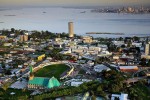
Brazzaville
The city of Brazzaville is the capital of the Republic of Congo and one of the country's main industrial centers. It sits on the west bank of the Malebo Pool at the beginning of the navigable portion of the Upper CONGO RIVER, a place known as “the gateway to the heart of Africa.” Founded by the French in 1883, […]
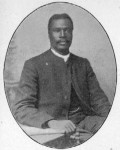
Braide, Garrick Sokari
ca. 1882–1918 Nigerian religious leader Garrick Sokari Braide, a Nigerian missionary and prophet, was largely responsible for the spread of Christianity in the Niger Delta region of Africa in the early 1900s. His preaching and methods combined traditional African elements with Christianity and stressed prayer and faith healing. Braide was born in the village of Obonoma, the center of […]
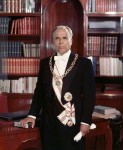
Bourguiba, Habib
1903–2000 President of Tunisia Habib Bourguiba, son of a former Tunisian army officer, grew up under French colonial rule in TUNISIA. He was a leader in his country's independence movement and became its first president in 1957. After receiving a good education in Tunisia, young Bourguiba studied law in Paris. There he met other North Africans who were […]

Boundaries in Africa
Before the arrival of European colonists, African boundaries were very loosely defined. Borders reflected the territories inhabited and controlled by different ethnic groups, and they often changed over time—generally as a result of migration or conquest. Moreover, these boundaries did not define all the available space in Africa. Some areas remained unclaimed or served as neutral zones between indigenous ethnic […]

Boumedienne, Houari
ca. 1927–1978 President of Algeria Hoauri Boumedienne was the first vice president of ALGERIA after it won independence from France in 1962. Three years later, he led a coup against President Ahmed BEN BELLA. Boumedienne became Algeria's president and remained in that position until his death. In his youth, Boumedienne was involved in the movement for Algerian independence. He rose […]
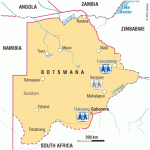
Republic of Botswana
POPULATION: 2.039 million (2014) AREA: 231,804 sq. mi. (600,372 sq. km) LANGUAGES: English, Setswana (both are official) NATIONAL CURRENCY: Pula PRINCIPAL RELIGIONS: Christian 50%, traditional 50% CITIES: Gaborone (capital), 134,000 (1999 est.); Serowe, Francistown, Lobatse, Selibi-Phikwe, Kanye, Maun, Molepolole, Ramotswa, Mochudi, Ghanzi ANNUAL RAINFALL: Varies from 18–25 in. (460–625 mm) in the extreme northwest to less than 5 in. (125 mm) in the extreme […]
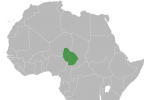
Bornu
The empire of Bornu existed in north central Africa from about 1400 to 1900, when it became part of Britain's colonial empire. Bornu had its origins in an earlier state named Kanem that arose around 1200 in what is now southwestern CHAD. The leaders of Kanem were divided into two competing dynasties: the Duguwa and the Sayfuwu. Driven out […]
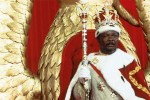
Bokassa, Jean-Bedel
1921–1996 President of the Central African Republic Military leader Jean-Bedel Bokassa became the president of the CENTRAL AFRICAN REPUBLIC after a coup in 1966. Eleven years later, he had himself declared emperor and renamed the country the Central African Empire. The son of a village chief, Bokassa began his military career in the French army in 1939. He fought […]
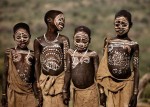
Body Adornment and Clothing
People communicate information about themselves by the clothes they wear and the way that they adorn their bodies. In Africa body decoration and dress may offer clues to a person's age, ethnic group, region, social position, and even political opinions. As Western-style attire becomes more common in Africa, some traditional types of adornment and dress are fading from everyday use—especially […]
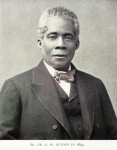
Blyden, Edward Wilmot
1832–1912 Pioneer of Pan-African Unity Edward Blyden was a teacher and author who promoted the idea of black African pride. He stressed the importance of African languages and culture but also explored the possibility of combining African and Western cultures. The inventor of the phrase “African personality,” Blyden laid the groundwork in his writings for the NEGRITUDE movement of the […]
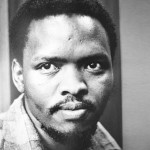
Biko, Steve
1946–1977 South African social activist Steve Biko, an outspoken opponent of apartheid, earned fame as a leader of the black consciousness movement in the 1960s and 1970s. The movement was based on the belief that the divisions between whites and blacks in South Africa were so great that blacks could not count on whites to end apartheid. Biko also […]
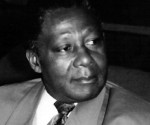
Beti, Mongo
1932–2001 Cameroonian novelist Mongo Beti is Cameroon's most celebrated novelist. His early novels usually explore the conflict between traditional African values and those of European colonialists. His best-known works, published in the 1950s, feature characters who come to understand the injustice of colonial rule and to realize they must help end it. Beti's most famous novel, Le Pauvre Christ […]
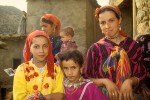
Berbers
The Berbers are a cluster of peoples who live in North Africa and in the northern parts of the Saharan countries of MALI, NIGER, and MAURITANIA. The Berbers have their own languages, which belong to the Hamitic or Afro-Asiatic language family, and they write in their own scripts. The native people of the region, the Berbers resisted the Arab […]
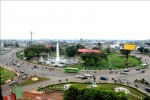
Benin City
Located in the Bendel State of southern NIGERIA, Benin City is famous for the work of its numerous artisans. Despite its name, the city is not related to the nation of BENIN, which lies west of Nigeria. Around A.D. 1000 a center of regional importance arose on the site of the present Benin City. This early town, also known […]
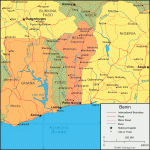
Republic of Benin
POPULATION: 10.60 million (2014) AREA: 43,483 sq. mi. (112,620 sq. km) LANGUAGES: French (official); Fon, Yoruba, Adja, Banba NATIONAL CURRENCY: CFA franc PRINCIPAL RELIGIONS: traditional 70%, Christian 15%, Muslim 15% CITIES: Porto Novo (capital), 330,000 (1999 est.); Cotonou, Abomey, Ouidah, Parakou, Natitingu ANNUAL RAINFALL: Varies from 58 in. (1,500 mm) in the southeast to 30 in. (770 mm) in the extreme north ECONOMY: GDP […]
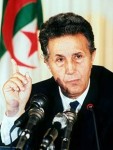
Ben Bella, Ahmed
1916–2012 First president of Algeria Aleading figure in Algeria's struggle for independence from France, Ahmed Ben Bella served as the country's first president from 1963 to 1965. Educated at a French primary school near Oran, ALGERIA, he became involved with the independence movement while pursuing further studies in the nearby city of Tlemcen. During World War II he served in […]
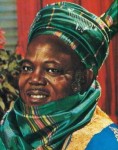
Bello, Ahmadu
1910–1966 Premier of Northern Nigeria Ahmadu Bello, a Nigerian leader, served as the first premier of Northern NIGERIA in 1954, when the country was under British rule. He was active in the Northern People's Congress (NPC), a cultural organization that he helped transform into a political party in the early 1950s. Under Bello's leadership, Northern Nigeria and the NPC […]
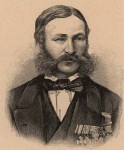
Barth, Heinrich
1821–1865 German traveler and explorer Heinrich Barth was a German-born scholar who made two long trips to Africa that he recorded in a book called Travels and Discoveries in North and Central Africa. Barth's extensive knowledge of the peoples and places described in his book made it a standard reference for scholars of Africa. Barth was educated in Berlin, […]
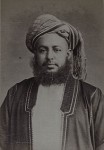
Barghash ibn Sa’id
1833(?)–1888 Sultan of Zanzibar Sultan Barghash ibn Sa'id ruled ZANZIBAR from 1870 until his death in 1888. He was a reformer who tried to eliminate corruption and to improve the economy of Zanzibar. Barghash rebuilt the clove economy after it was destroyed by a hurricane in 1872. Later he established a fleet of steamships that boosted the country's trade […]
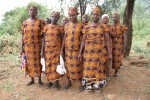
Bantu Peoples
The Bantu, a large group of related peoples, originated along what is now the border between NIGERIA and CAMEROON and spread throughout central and southern Africa. The term Bantu is sometimes used to describe all Africans and African culture in general. But this use of the term is inaccurate; Bantu peoples make up only about a third of Africa's population. […]
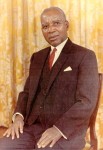
Banda, Ngwazi Hastings Kamuzu
1898–1997 President of Malawi Dr. Hastings Kamuzu Banda served as president of MALAWI from 1966 to 1994. His presidency was a time of one-party rule. Born in the British colony of Nyasaland (present-day Malawi), Banda left home at age 17 to study in SOUTH AFRICA. Later he traveled to the United States, where he attended college and medical school. […]
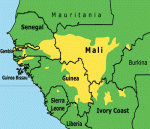
Bambara
With a population estimated at 3 million, the Bambara are the largest ethnic group in MALI. Large numbers of them live in northern IVORY COAST as well. They are sometimes called Bamana, the name of the Mande language they speak. In the 1700s two Bambara kingdoms arose in the region, but they fell to Muslim forces during the 1800s. […]
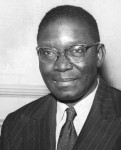
Azikiwe, Benjamin Nnamdi
1904–1996 President of Nigeria Benjamin Nnamdi Azikiwe was the first president of the Federal Republic of NIGERIA, after the country won its independence from Britain in 1960. As a young man, Azikiwe left Nigeria to study in the United States. He earned master's degrees in both political science and anthropology. After his studies, he worked for three years as […]
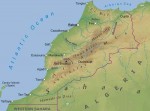
Atlas Mountains
The Atlas Mountains are the principal geographic feature of the North African countries of MOROCCO, ALGERIA, and TUNISIA. They are made up of six mountain ranges—the Anti-Atlas, the High Atlas, the Middle Atlas, the Saharan Atlas, the Tell Atlas, and the Aures—with high plateaus and plains between them. The mountains run northeast from the Atlantic coast of Morocco to the […]

Asma’u, Nana
1793–1864 Islamic poet and teacher Nana Asma'u, an Islamic teacher in what is now northern Nigeria, was known for her writings and for her work in educating Muslim women. Fluent in Arabic and several African languages, she memorized the entire Muslim holy book, the Qur'an. Her father, UTHMAN DAN FODIO, was an Islamic ruler who led a jihad in […]

Askiya Muhammad I
(?)–1528 Ruler of the Songhai Empire Askiya Muhammad I was a statesman and military leader who ruled the Songhai Empire of West Africa for more than 30 years. During his reign Muhammad not only expanded the empire, he also reorganized it and transformed it into a Muslim kingdom. He is said to have been a nephew of the Songhai […]
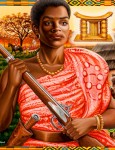
Asantewa, Yaa
ca. 1832–1921 Asante queen Yaa Asantewa was queen of the ASANTE town of Edweso, located in present-day GHANA. In 1900 she led a three-month siege against British troops in the Asante capital of Kumasi. The British had seized Kumasi four years earlier in an attempt to extend their control of the country, then known as the Gold Coast. They […]
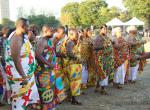
Asante
The Asante (Ashanti) are the largest and most powerful of a cluster of AKAN chiefdoms of southern GHANA and IVORY COAST. Originating around Lake Bosumtwi, the Asante migrated to the area around the town of Tafo in the early 1600s. Around 1700, Chief Osei Tutu made alliances with several surrounding kingdoms to form the Asante Union. Included in the union […]

Art
Each of the hundreds of different cultures in Africa has its own artistic traditions and its own ideas of what is beautiful or important. Variations in the style and form of artworks, as well as in the materials used to produce them, reflect such factors as a region's geography and climate, its social customs, and the available technology. Of […]

Architecture
From small mud huts to towering steel skyscrapers, African architecture is a mix of indigenous and foreign, old and new. The continent's diverse architecture reflects its varied climates and environments as well as the many different cultures and traditions of African peoples. Outside influences have played a major role as well. European designs and building methods can be seen in […]
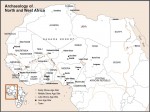
Archaeology and Prehistory
Africa's archaeological heritage is both ancient and rich. Several million years ago, the first ancestors of humans emerged in Africa. About 100,000 years ago, the first modern people appeared there as well. Since that time, a pageant has unfolded across the continent's vast and varied landscapes. Multitudes of cultures have emerged, peoples have migrated, empires have risen and fallen, and […]
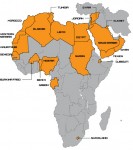
Arabs in Africa
Arabs have lived in Africa since at least the A.D. 600s, when people from the Arabian peninsula conquered EGYPT and LIBYA. Arabs eventually controlled much of North Africa. Arab culture—including the Arabic language and the practice of Islam—has been so widely adopted that Egypt, Libya, ALGERIA, TUNISIA, and MOROCCO are now considered to be part of the Arab world. Other […]
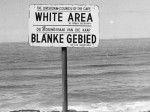
Apartheid
Apartheid, a system of racial segregation, was official government policy in the Republic of SOUTH AFRICA from 1948 to 1994. Under apartheid, South African blacks, Asians, and people of mixed ancestry called “Coloureds” were systematically separated from white society, deprived of any participation in government, and subjected to all forms of discrimination. The idea of white supremacy and racial discrimination […]
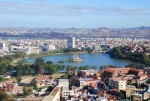
Antananarivo
Located on hills overlooking the Ikopa and Betsiboka Rivers, Antananarivo is the capital and largest city of MADAGASCAR. A king of the Merina people called Andrianjaka conquered the site in the early 1600s. Antananarivo, which means “city of a thousand,” was named for the guard of 1,000 men who defended it after Andrianjaka's conquest. By 1800 the Merina kingdoms established […]
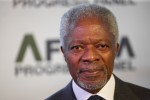
Annan, Kofi
1938– Ghanaian diplomat Elected Secretary-General of the United Nations (UN) in 1997, Kofi Annan is the first Secretary-General from Africa south of the Sahara. This diplomat from GHANA has worked for the UN since 1962, except for a brief period in the 1970s when he served as Ghana's director of tourism. Before embarking on his career in diplomacy, Annan […]
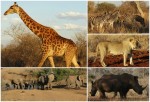
Animals, Domestic
Africans have been raising animals for their own use for thousands of years. Species of domesticated animals spread slowly southward through Africa, beginning around 3000 B.C. or earlier, and livestock herding became a traditional way of life across broad regions of the continent. Cattle, in particular, have played a central role in the social, economic, and religious lives of many […]
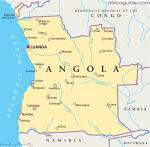
Republic of Angola
POPULATION: 22.14 million (2014) AREA: 481,351 sq. mi. (1,246,700 sq. km) LANGUAGES: Portuguese (official); Bantu languages (at least 55) NATIONAL CURRENCY: Kwanza PRINCIPAL RELIGIONS: Traditional 47%, Roman Catholic 38%, Protestant 15% CITIES: Luanda (capital), 2,677,000 (2000 est.); Lobito, Benguela, Malanje, Huambo, Cabinda, Lubango ANNUAL RAINFALL: Varies from 0 in southwestern coastal desert to 70 in. (1,780 mm) in extreme north ECONOMY: GDP $131.4 […]
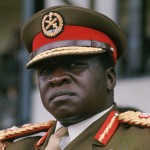
Amin Dada, Idi
ca. 1925–2003 Ugandan dictator Idi Amin Dada, a member of the Nubi people, ruled UGANDA from 1971 to 1979. Regarded as one of Africa's most ruthless leaders, Amin used murder as a political tool, and may have killed as many as 300,000 people during his reign. Enlisting in the military as a young man, Amin advanced rapidly. He was […]
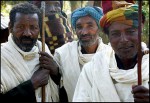
Amhara
The Amhara and the Tigrinya, indigenous peoples of ETHIOPIA, make up the group commonly known as Abyssinians. Both the Amhara and the Tigrinya are descendants of the founders of the ancient kingdom of AKSUM, and both speak Semitic languages. Originally based in the Ethiopian highlands, the Amhara gradually spread out to settle a large area of central Ethiopia. The Tigrinya […]
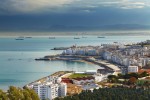
Algiers
Algiers, the capital of ALGERIA, is situated on a hillside overlooking the Mediterranean Sea. Home to 3.7 million people, it is one of the major cities of North Africa. The various sections of the old city show the different cultures that have influenced Algiers: French-style districts of wide boulevards alternate with Arab sections such as the Casbah, a neighborhood of […]

The Democratic and Popular Republic of Algeria
POPULATION: 39.93 million (2014) AREA: 919,595 sq. mi. (2,381,740 sq. km) LANGUAGES: Arabic (official); French, Berber dialects NATIONAL CURRENCY: Algerian dinar PRINCIPAL RELIGIONS: Muslim (Sunni) 99%, Christian and Jewish 1% CITIES: Algiers (capital), 4,200,000 (1999 est.); Oran, Constantine, Annaba, Batna ANNUAL RAINFALL: Varies from 30 in. (760 mm) along the coast to less than 4 in. (100 mm) in the Sahara ECONOMY: GDP […]
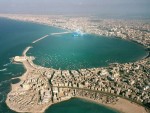
Alexandria
Located on a spit of land near the NILE RIVER delta, Alexandria is the second largest city in EGYPT and the country's main port. It was founded in 332 B.C. by Alexander the Great and quickly emerged as the leading city of the Mediterranean region. Renowned in the ancient world as a center of learning, Alexandria possessed the greatest […]
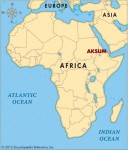
Aksum
Aksum was a kingdom located in present-day ERITREA and northern ETHIOPIA between about 200 B.C. and A.D. 650. Its capital city of Aksum sat on the western edge of the Eritrean highlands and was for several centuries a powerful and wealthy city. Historians take a particular interest in Aksum because its ruler, Ezana, converted to Christianity in 340, shortly […]
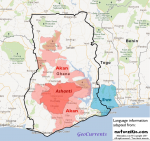
Akan Region
The Akan region, an area on the coast of West Africa's Gulf of Guinea, lies between the Bandama River in IVORY COAST and the Volta River in GHANA. During the 1600s, separate, competing states were formed in the northern and southern parts of the region. Before the 1400s, the region consisted of small communities of Akan clans. These people […]
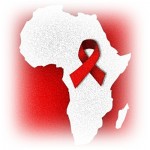
AIDS
AIDS (acquired immunodeficiency syndrome) is a fatal disorder affecting millions of people around the world. A leading cause of death among adults in sub-Saharan Africa, AIDS threatens to overwhelm many African nations and disrupt their social and economic development. AIDS is caused by HIV, a virus that attacks and destroys the body's immune system, making the infected person susceptible to […]

Agriculture
Agriculture plays a central role in the economies of nations throughout Africa, accounting for between 30 and 60 percent of all economic production. In many African nations, a majority of the people is engaged in farming, producing goods for domestic use and sometimes for export as well. Peasant and subsistence farming is the basic form of agriculture in most parts […]
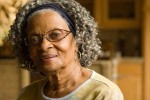
Age and Aging
Age has two significant roles in traditional African cultures south of the Sahara. First, respect for age and for the elderly is a universal social ideal. Second, many societies are organized into groups by age, and membership in such groups helps define a person's sense of identity and place in the community. Recent social changes have somewhat weakened these values […]

Afrikaner Republics
The Afrikaner Republics were independent states established in the 1850s by Dutch colonists (Afrikaners) from British-ruled SOUTH AFRICA. The two longest-lived of the Afrikaner Republics were the Orange Free State, located between the Orange and Vaal Rivers, and the South African Republic (or Transvaal), between the Limpopo and Vaal Rivers. Each state had a strong central government, a judicial system […]
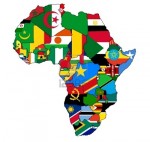
Africa, Study of
The study of Africa has a long history. People have been gathering information about the continent since ancient times. Early reports came mostly from travelers, explorers, missionaries, and merchants. Later, scholars in fields such as history, anthropology, geography, and the natural sciences began to conduct research there. Early Contact In ancient times, people living outside Africa knew little about it. […]

Addis Ababa
Addis Ababa, the capital and largest city in ETHIOPIA, is located on a high plateau in the center of the country. As home to the ORGANIZATION OF AFRICAN UNITY, an organization devoted to the interests of African states, Addis Ababa is also the diplomatic capital of Africa. Addis Ababa was founded in 1886 by Empress Taitu, the wife of Ethiopian […]